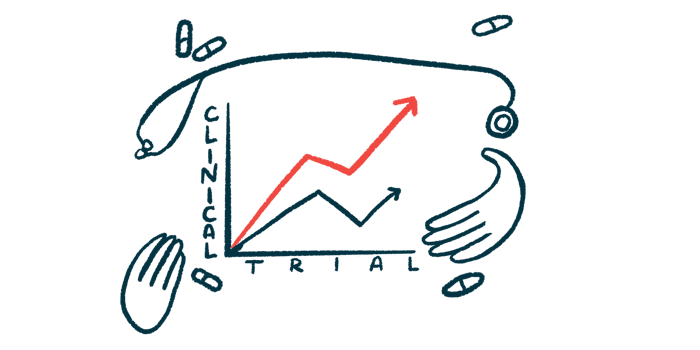Iptacopan by Novartis seen to increase hemoglobin to near normal
No need for blood transfusions for PNH patients in Phase 3 trials

Iptacopan, an experimental oral medication being developed by Novartis, increased hemoglobin to near-normal levels in people with paroxysmal nocturnal hemoglobinuria (PNH) — without the need for blood transfusions — according to data from two global Phase 3 clinical trials.
The trials, APPLY-PNH (NCT04558918) and APPOINT-PNH (NCT04820530), were evaluating the efficacy and safety of 200 mg of iptacopan, taken twice daily in the form of a hard gelatin capsule.
The positive results were found regardless of whether participants had been previously treated with anti-C5 medications that prevent the destruction of red blood cells.
The data were presented at the 49th Annual Meeting of the European Society for Blood and Marrow Transplantation (EBMT), recently held in Paris.
“We continue to be impressed by the totality of evidence from APPLY-PNH and APPOINT-PNH, which confirm the practice-changing potential of iptacopan in the treatment of PNH,” David Soergel, MD, global head of Novartis’ cardiovascular, renal, and metabolism development unit, said in a company press release.
Novartis planning regulatory submissions for iptacopan
With this new evidence in hand, the company is preparing to soon submit applications to global regulatory agencies for iptacopan.
“We look forward to our first submissions to regulatory authorities for PNH in the first half of this year,” Soergel said.
PNH is a rare disease in which red blood cells become liable to attack by the complement system, a cascade of proteins that work with the immune system to protect the body against infection and to remove damaged cells or foreign material.
When there’s hemolysis, or a breakdown of red blood cells, people with PNH can develop anemia, or a shortage in the number of red blood cells, and fatigue.
Several medications to prevent hemolysis are available, which mainly work by targeting C5, a protein of the complement system. Two such approved therapies are Soliris (eculizumab) and Ultomiris (ravulizumab).
However, not everyone responds well to these medications, and many patients continue to experience symptoms and to require blood transfusions even when receiving treatment.
A first-in-class medication, iptacopan is designed to target factor B, another protein of the complement system. Because factor B lays upstream of C5 in the cascade, iptacopan is expected to prevent not only intravascular, but also extravascular hemolysis. Intravascular hemolysis is the breakdown of red blood cells in the bloodstream, whereas extravascular hemolysis refers to red blood cell destruction occurring outside blood vessels, mostly in the liver and spleen.
In APPLY-PNH, iptacopan was evaluated in 97 adults with PNH who experienced residual anemia despite being on standard of care treatment with Soliris or Ultomiris for at least six months. A total of 62 patients were randomly assigned to twice-daily, oral iptacopan; the remaining 35 continued on intravenous (into-the-vein) standard of care treatment for 24 weeks, or nearly six months more.
After this period, it was found that iptacopan outperformed anti-C5 medications in its ability to increase the levels of hemoglobin — the protein in red blood cells that carries oxygen and whose levels are often used to check for anemia.
The estimated proportion of patients who had an increase of 2 g/dL or more in their hemoglobin levels (82.3% vs. 2%) and of those who achieved hemoglobin levels of 12 g/dL or more (68.8% vs. 1.8%) was higher in the iptacopan group compared with the standard of care group.
“These hematological [blood-related] benefits were associated with transfusion independence in most patients and meaningful improvements in patient-reported fatigue,” the researchers wrote in an abstract.
Novartis therapy iptacopan named orphan drug, breakthrough therapy
In APPOINT-PNH, iptacopan was evaluated in 40 treatment-naïve adults with PNH. Treatment-naïve means these individuals had never been on complement inhibitor therapies, including anti-C5 medications. The mean ages of the patients was 42.1, and many (70%) had received blood transfusions in the six months prior to entering the trial.
After six months of treatment, an estimated proportion of 92.2% of patients met the primary efficacy endpoint, which was an increase of 2 g/dL or more in their hemoglobin levels without the need for blood transfusions.
Almost two-thirds (62.8%) achieved hemoglobin levels of 12 g/dL or more, and almost all (97.6%) remained free of blood transfusions, as reported in a separate abstract. Moreover, there was a decrease in the levels of lactate dehydrogenase, a marker of intravascular hemolysis, as well as other clinically meaningful improvements in easing fatigue.
“The APPOINT-PNH results are consistent with the tolerability and safety profiles seen in APPLY-PNH and show oral iptacopan controls hemolysis while nearly eliminating the need for blood transfusions,” said Régis Peffault de Latour, MD, PhD, an investigator at Saint-Louis Hospital, in Paris.
These data underscore the potential of iptacopan to be a practice-changing oral medicine for this devastating disease.
Antonio Risitano, MD, PhD, who presented the data at EBMT and is the president of the International PNH Interest Group, noted that treatment with iptacopan led to “improvement of anemia never seen before with anti-C5s.”
“These data underscore the potential of iptacopan to be a practice-changing oral medicine for this devastating disease,” Risitano said.
Iptacopan has received breakthrough therapy designation from the U.S. Food and Drug Administration (FDA) and orphan drug designations from the FDA and the European Medicines Agency for the treatment of PNH.









